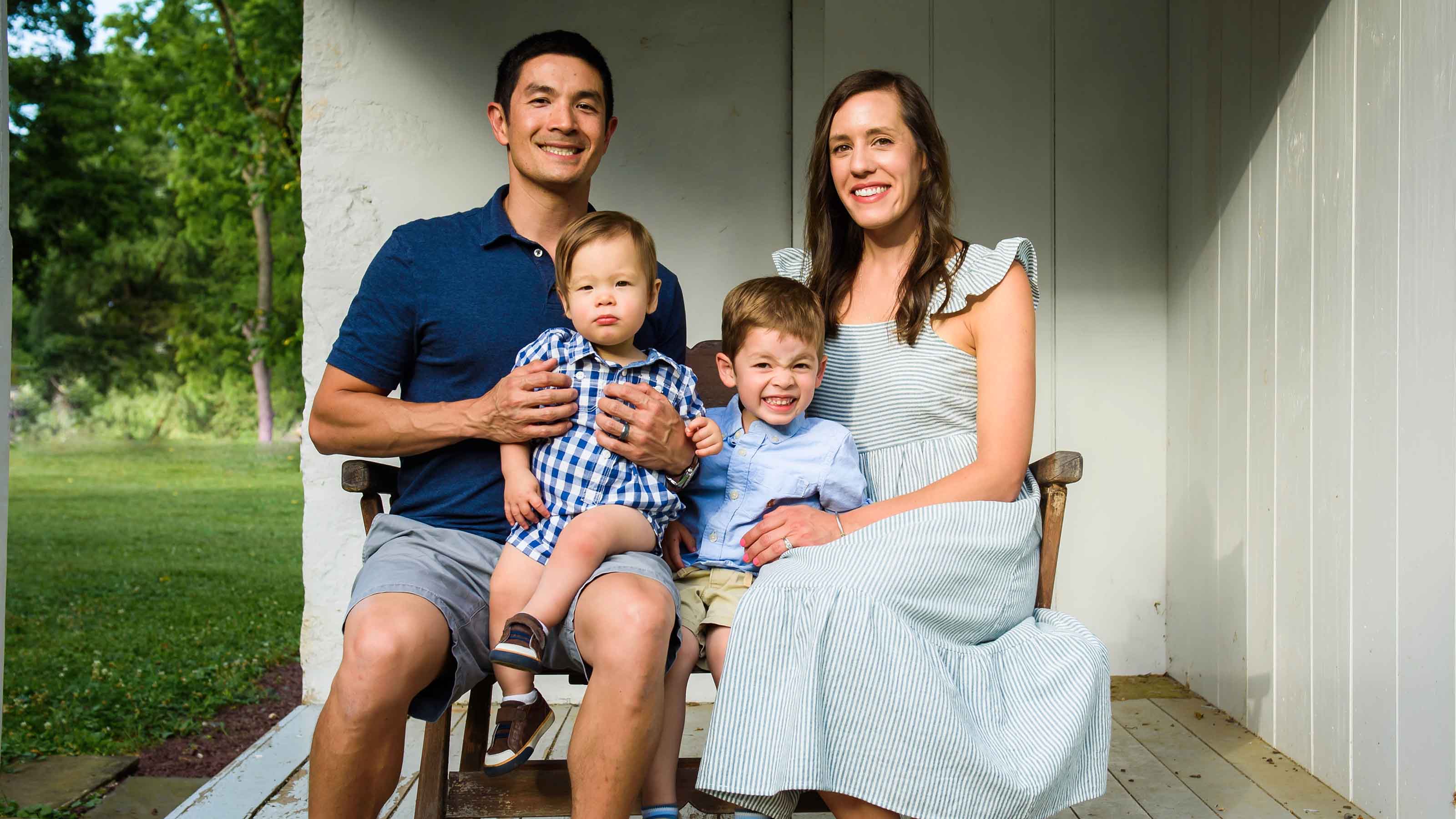How Four Households Are Tackling Inflation
Inflation and a possible recession affect all of us, but in different ways. We asked families in various stages of life how they are coping with the highest increase in prices in four decades.


Profit and prosper with the best of Kiplinger's advice on investing, taxes, retirement, personal finance and much more. Delivered daily. Enter your email in the box and click Sign Me Up.
You are now subscribed
Your newsletter sign-up was successful
Want to add more newsletters?

Delivered daily
Kiplinger Today
Profit and prosper with the best of Kiplinger's advice on investing, taxes, retirement, personal finance and much more delivered daily. Smart money moves start here.

Sent five days a week
Kiplinger A Step Ahead
Get practical help to make better financial decisions in your everyday life, from spending to savings on top deals.

Delivered daily
Kiplinger Closing Bell
Get today's biggest financial and investing headlines delivered to your inbox every day the U.S. stock market is open.

Sent twice a week
Kiplinger Adviser Intel
Financial pros across the country share best practices and fresh tactics to preserve and grow your wealth.

Delivered weekly
Kiplinger Tax Tips
Trim your federal and state tax bills with practical tax-planning and tax-cutting strategies.

Sent twice a week
Kiplinger Retirement Tips
Your twice-a-week guide to planning and enjoying a financially secure and richly rewarding retirement

Sent bimonthly.
Kiplinger Adviser Angle
Insights for advisers, wealth managers and other financial professionals.

Sent twice a week
Kiplinger Investing Weekly
Your twice-a-week roundup of promising stocks, funds, companies and industries you should consider, ones you should avoid, and why.

Sent weekly for six weeks
Kiplinger Invest for Retirement
Your step-by-step six-part series on how to invest for retirement, from devising a successful strategy to exactly which investments to choose.
Americans have survived a few brushes with economic uncertainty over the past few years. In 2019, roughly 800,000 federal employees and contractors were furloughed for a little over a month, leaving many scrambling to cover bills. In 2020, the COVID-19 pandemic briefly stalled the economy, forcing some businesses to close and lay off their employees. But those disruptions didn’t prepare families for the financial pain wreaked by the steep rise in the prices for everything from gas to groceries.
The cost of goods and services rose 9.1% in June—a 40-year high—and Kiplinger forecasts that the inflation rate will end the year at 8% to 9%. There’s no sign it will return to normal anytime soon, which has heightened financial anxiety for millions of families.
Overall, Americans are reducing their spending, and some are looking for extra income. Two-thirds of respondents surveyed by CIT Bank said they were cutting back on spending, and 38% said they’re postponing major purchases. In addition, 85% said inflation is making it harder for them to save. The bear market, which is caused at least in part by the Federal Reserve’s inflation-fighting stance, is also putting pressure on American households.
To keep their heads above water, some Americans are turning to side gigs for extra income. Others are driving less or cutting back on summer vacation plans. Still others have enough in savings to tough it out. But even those who are financially above water are rearranging some aspects of their daily lives.

The Jones: Asking Teenage Daughters to Chip In
Like many American families, Krista and Dave Jones, who live in Cincinnati, are using coupons at the grocery store, taking advantage of grocery store fuel points to lower the cost of gas, and driving less in general. Both Krista, 47, and Dave, 50, work from home most of the week, so it’s easier to drive less. Although they don’t go through every purchase in their bank and credit card statements, they review the trend lines in each report. That has led them to scale back on restaurant and takeout meals, and they’ve loaded up on items such as shampoo and toothpaste when they go on sale. The biggest item the Joneses eliminated this summer was their gym membership, which cost several hundred dollars a year.
The Joneses have two daughters—Madeline, 18, and Kayla, 14. Madeline will attend the University of Cincinnati this fall, and they plan to ask their auto insurer for a policy discount, as Madeline’s car will remain mostly stationary. “We’ve always been conservative in our spending, so inflation isn’t hitting us as hard,” Krista says.
Krista works for a local hospital, and Dave is an information technology engineer. Both were fortunate enough to earn a small bonus from their employers during the peak of the COVID-19 pandemic.
Krista and Dave both contribute 15% to their employer-provided retirement plans, and they don’t plan to lower their contribution rates anytime soon. That means they’re not immune to the stock market turmoil triggered by inflation and fears of a recession, but they are willing to ride out the bear market.
“Luckily, we’re nowhere near retirement, but it’ll be here before we know it,” Krista says. “I’m hoping the market returns to some normalcy so that we can enjoy the money we worked hard to save.”
The cost of college was rising even before inflation took off. Although their regular contributions to a 529 college-savings plan have helped them plan for college costs, there are still unexpected expenses—such as furnishing a dorm room. Inflation has made those costs even tougher to manage.
However, the Joneses are ahead of the curve. Madeline has been working about 15 hours a week at a retail job since last August. She has her own savings account that will go toward college expenses not covered by the family’s 529 plan, and Krista hopes the money lessons she’s taught Madeline will stick.
“Since both of my girls were little, we’ve tried to teach them to think of wants versus needs,” Krista says. For example, Krista and Dave asked Madeline to save some of her money to help purchase her car when she was 16. “We wanted her to feel like she had some ownership of her car purchase,” Krista says. Because Madeline isn’t taking her car to school, she won’t have to pay for gas or parking on campus, and she’ll save money on maintenance and repairs.

Will and Anna: Maximizing Rewards to Raise Two Young Children
Will and Anna (they asked us not to use their last names to protect their privacy) of Bucks County, Pa., have had to shoulder the higher costs of caring for their sons, Theo, 1, and Jack, 4.
To lower those costs, they’re using points from rewards credit cards as much as possible. They use their Amazon Prime Visa Signature card to take advantage of a recent 5% cash-back promotion on gas purchases. They’ve also made it a point to use their American Express Gold Card to buy groceries and pay for restaurant meals. The card offers members four points per dollar spent at supermarkets (on up to $25,000 of such purchases per year) and at restaurants. Cardholders also get $10 monthly in Uber Cash to use for Uber rides or Uber Eats orders, and up to $10 a month in credits for purchases from several restaurants and delivery services. Ordinarily, the card comes with an annual fee of $250, but because Will is an active member of the military, American Express exempts them from the fee.
The rewards points help, because with two young children, the couple do not have the ability to make big changes in the food they buy, Will says. And even before inflation pushed up the cost of gas and airline tickets, the couple didn’t go on a lot of vacations. Even in noninflationary times, traveling with very young children gives most parents pause.
Will, 38, who is in the Air National Guard, is enrolled in the Thrift Savings Plan, the federal government’s version of a 401(k) plan, and he intends to contribute the maximum in 2022—$20,500 for workers younger than 50. The money is automatically deducted from his paycheck. In addition, Will and Anna plan to contribute the maximum to their Roth IRAs, something they’ve done for several years. For 2022, they can each contribute up to $6,000, for a total of $12,000.
Will has also been doing more of his own investment research, including looking at the types of investments that outperform when inflation is high. The idea to add more energy stocks to his portfolio came to him after he saw what it would cost to heat his home.
The family has a 250-gallon heating oil tank in their basement that they have to fill two to three times each winter to heat their home. Last year, the price to fill their tank doubled, from $400 to $800. Heating costs are expected to remain high this winter. “The energy costs were eye-opening,” Will says, and that led him to add more oil and gas companies to his portfolio through individual stock purchases.
The couple say they would reduce contributions to their retirement savings only as a last resort. In a pinch, Will says, they’d even be willing to pull money from their emergency fund—which they haven’t touched in years—to make contributions to their Roth IRAs. The couple have also stashed money in a taxable account, but inflation has reduced the amount they can sock away there.

The Gosses: Anticipating Tax Hikes in Retirement
While most retirees don’t have to worry about dependents, living on a fixed income during inflationary times requires careful planning. Fortunately, Gary and Deb Goss of Orange, Calif., haven’t had to change their lifestyle much because of inflation, in part because they had already changed their spending habits in response to the pandemic. But they’re taking other steps to prepare for the long-term impact of inflation on their nest egg.
“Being older, we are very concerned about the pandemic and we have continued to mostly shelter in place,” says Gary, 68, who is a retired physician. They still aren’t going out much because the pandemic isn’t over, he adds.
Driving less has helped the couple manage the sharp rise in the price of gas, which cost about $6 per gallon in Orange County in mid July, according to AAA. Gary estimates that he has filled up the tank of his or Deb’s vehicle a total of three times since March. The couple live within a roughly three-mile radius of a grocery store and other services they need. While getting rid of one of their cars would lower insurance costs, Gary says they need both cars in case one breaks down. They may buy out the lease on one of their cars, depending on the price when the lease expires next year.
Also working in the Gosses’ favor: stable housing costs. The couple sold their home in 2017 and downsized to a place that required less maintenance. Since then, the landlord hasn’t increased their rent.
In addition, Gary’s pension and savings are enough to cover necessities, even at higher prices. “We’ve honestly been insulated from a lot of things,” Gary says. But he knows that’s not everyone’s situation. “I’m just worried for others who still have a mortgage and kids,” he says.
Planning for the future hasn’t stopped the Gosses from living in the moment, but inflation has led them to alter their travel plans. In the past, they frequently vacationed in Europe, but they recently decided a getaway to Mexico was more affordable. In March they took a COVID-19-safe vacation to a resort in Rosarito Beach, a two-hour drive from home. The cost was about $1,800 to stay for a month.
Meanwhile, Noah Damsky, the Gosses’ financial adviser, has been making moves to protect the couple’s nest egg from the long-term impacts of inflation. If inflation remains high for several years, the cost of interest on the federal government’s debt will rise, says Damsky, a chartered financial analyst. That could compel Congress to increase tax rates to cover the higher cost of interest, he says. Even if that doesn’t happen, the individual tax rate reductions implemented in the 2017 Tax Cuts and Jobs Act will expire in 2026 unless Congress extends them.
Damsky has started to convert some of Gary’s tax-deferred retirement savings to Roth accounts, which will insulate those funds from future tax increases. (Withdrawals from Roth accounts are tax-free as long as the owner is 59½ or older and has owned the Roth for at least five years.) California doesn’t tax Social Security income, though most other forms of retirement income are taxable. So far, the couple haven’t had to tap those accounts because Gary’s pension covers their expenses.
Damsky is also keeping the couple invested in municipal bonds, which are issued by state and local governments. The main attraction of municipal bonds is that interest income is typically free from federal taxes—and for muni bonds issued in the owner’s state of residence, from state and local taxes as well. Plus, muni bond yields have climbed higher in anticipation of Fed rate hikes, and that has made their tax-adjusted yields even more attractive.

Aaron Mulherin: Taking a self-Imposed Pay Cut
Life as a single man with no dependents has helped insulate Aaron Mulherin’s household budget from inflation, but it has created numerous challenges for the small business he has owned since 2019.
Mulherin, 25, owner of AM Glass Repair in Marion, Iowa, works on residential and commercial properties, repairing individual glass panes on homes and installing new windows on commercial buildings. In recent weeks, he has seen the cost of materials jump by about 40%. And it’s difficult to increase the rates he charges customers once a contract is locked in.
Mulherin has tried to persuade customers to pay more by showing them how much his costs have risen, but most building owners are reluctant to shell out more money. “They don’t want to give you more money later after locking in a price,” says Mulherin.
Mulherin has stopped paying himself in order to increase the amount of revenue available to cover his material costs and pay his employees, who earn $15 to $17 an hour depending on experience. “I haven’t been pulling a paycheck for myself in quite a while, but that’s okay,” Mulherin says.
He has saved enough to cover his household expenses for the near future, so his personal finances are in good shape. He drives a 2011 Chevy Impala for personal use that he bought for $6,000 in cash. And because of the nature of his business, a summer vacation isn’t on the table. “You have to keep working in the summer in case the winter gets slow due to weather,” Mulherin says.

Inflation Fighting Tips and Tricks
Even though the families we’ve profiled didn’t make major changes in their lifestyles, they offer lessons for anyone looking to survive inflationary times. And their experiences show that beating inflation involves more than clipping coupons and cutting back on driving, although those are certainly strategies that can save you money.
Earn rewards.
Shopping with the right rewards card can earn you points or miles that you can stockpile for future use. If you’re on the hunt for a new rewards card, check out our review of the best rewards credit cards. We ranked cards in various categories, including those best for travel, everyday purchases, gas and more.
The Abound Credit Union Platinum Visa, which earned gold in our gas category, offers 5% cash back on fuel purchases. The Sam’s Club Mastercard, which took silver, gives 5% back on up to $6,000 spent yearly at gas stations. You have to be a Sam’s Club member to sign up for the card. For those looking to earn straight-up cash back on all purchases, newcomer Wells Fargo Active Cash Visa won our first-place designation. It provides 2% cash back.
Pay down debt.
You also want to get your credit card debt under control—and fast. The Federal Reserve is expected to continue boosting short-term interest rates in an effort to cool down spending. When that happens, variable interest rates tied to the federal funds rate, such as credit card rates, go up as well.
If you’re carrying a balance, look into a balance-transfer card that offers a 0% introductory interest rate. Recently, cards from Wells Fargo, Capital One and Bank of America, among others, allowed balance transfers with an introductory rate of 0% for 15 to 18 months. Transaction fees apply—either a flat amount of up to $10 per transfer or 3% to 5% per transfer, whichever is greater. But this strategy will backfire if you don’t pay off the balance by the time the 0% rate ends.
Tweak your investments.
It’s critical that your portfolio be diversified and aligned with your tolerance for risk. Look for stocks and funds with stable growth and low volatility. You should also rebalance when the stock market throws your asset allocation out of whack. You can also check out the Kiplinger ETF 20, our list of our favorite (and cheap) exchange-traded funds that you can buy now.
Find other ways to cut back.
If you’ve trimmed all of the fat from your spending and need to start cutting muscle, you may need to decrease contributions to your retirement savings accounts. However, this isn’t a step you should take lightly. Saving less now means you’ll either have to work longer to make up for the lower savings rate or contribute more in your later years. If you have to cut back, try to continue contributing enough to receive any matching contributions from your employer.
Profit and prosper with the best of Kiplinger's advice on investing, taxes, retirement, personal finance and much more. Delivered daily. Enter your email in the box and click Sign Me Up.

Rivan joined Kiplinger on Leap Day 2016 as a reporter for Kiplinger's Personal Finance magazine. A Michigan native, she graduated from the University of Michigan in 2014 and from there freelanced as a local copy editor and proofreader, and served as a research assistant to a local Detroit journalist. Her work has been featured in the Ann Arbor Observer and Sage Business Researcher. She is currently assistant editor, personal finance at The Washington Post.
-
 Dow Absorbs Disruptions, Adds 370 Points: Stock Market Today
Dow Absorbs Disruptions, Adds 370 Points: Stock Market TodayInvestors, traders and speculators will hear from President Donald Trump tonight, and then they'll listen to Nvidia CEO Jensen Huang tomorrow.
-
 Quiz: Do You Know How to Maximize Your Social Security Check?
Quiz: Do You Know How to Maximize Your Social Security Check?Quiz Test your knowledge of Social Security delayed retirement credits with our quick quiz.
-
 Will You Get a Trump Tariff Refund in 2026? What to Know Now
Will You Get a Trump Tariff Refund in 2026? What to Know NowTax Law The Supreme Court's tariff ruling has many wondering about refund rights and how tariff refunds would work.
-
 9 Types of Insurance You Probably Don't Need
9 Types of Insurance You Probably Don't NeedFinancial Planning If you're paying for these types of insurance, you might be wasting your money. Here's what you need to know.
-
 Amazon Resale: Where Amazon Prime Returns Become Your Online Bargains
Amazon Resale: Where Amazon Prime Returns Become Your Online BargainsFeature Amazon Resale products may have some imperfections, but that often leads to wildly discounted prices.
-
 Roth IRA Contribution Limits for 2026
Roth IRA Contribution Limits for 2026Roth IRAs Roth IRAs allow you to save for retirement with after-tax dollars while you're working, and then withdraw those contributions and earnings tax-free when you retire. Here's a look at 2026 limits and income-based phaseouts.
-
 Four Tips for Renting Out Your Home on Airbnb
Four Tips for Renting Out Your Home on Airbnbreal estate Here's what you should know before listing your home on Airbnb.
-
 Five Ways to a Cheap Last-Minute Vacation
Five Ways to a Cheap Last-Minute VacationTravel It is possible to pull off a cheap last-minute vacation. Here are some tips to make it happen.
-
 How Much Life Insurance Do You Need?
How Much Life Insurance Do You Need?insurance When assessing how much life insurance you need, take a systematic approach instead of relying on rules of thumb.
-
 When Does Amazon Prime Day End in October? Everything We Know, Plus the Best Deals on Samsonite, Samsung and More
When Does Amazon Prime Day End in October? Everything We Know, Plus the Best Deals on Samsonite, Samsung and MoreAmazon Prime The Amazon Prime Big Deal Days sale ends soon. Here are the key details you need to know, plus some of our favorite deals members can shop before it's over.
-
 How to Shop for Life Insurance in 3 Easy Steps
How to Shop for Life Insurance in 3 Easy Stepsinsurance Shopping for life insurance? You may be able to estimate how much you need online, but that's just the start of your search.
